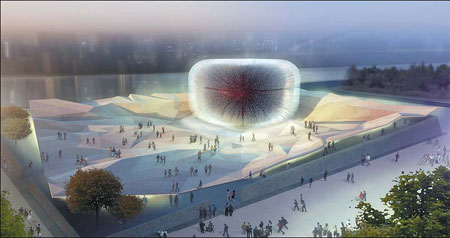On top of having 60,000 acrylic spikes holding seeds to stress the need for sustained conservation efforts, the gem-shaped UK Pavilion will be nestled in a bed of "wrapping paper" to symbolize growing Sino-UK relations, officials said last week.
|

An artistic rendition of the new-look UK pavilion at night |
"One of the key points of our story is offering our pavilion as a gift of friendship to the people of China, depicted by a landscape that looks like unwrapped wrapping paper," said Ian McCartney, commissioner-general of the UK's expo team, while unveiling the building's new design in Shanghai.
"We think we have found an iconic structure that will be one of the most seen, and most photographed, pavilions on the expo site," added the British politician, who was visiting the city to ink an agreement linking the pavilion with Expo Shanghai Online.
The privately and publicly financed pavilion, which is costing 13.8 million pounds ($22.8 million) to build, will also have a simplified color scheme. Instead of using a rainbow of colors, the futuristic cubic design will beam blue hues against a backdrop of white geometric shapes.
With over 230 countries and international organizations competing for 70 million people's attention at next year's expo, which runs from May 1 to October 31, McCartney said the UK's six-story design is intended to make guests stop and stare. Some have described the pavilion's new foundation as an Antarctic landscape; others claim the pavilion looks like a sparkling cushion.
"We want it to be thought-provoking. It's about engaging people, and you will see that it is even more thought-provoking when we release what is inside," said McCartney. "Some parts will be so good we are looking at ways of taking it to other parts of China. And of course the online aspect will take this way beyond the Expo Park, to the whole world."
He said the design should reflect the UK's role as an innovative country given its status at the leading edge of the pharmaceutical industry and as a country responsible for producing more leading scientists per square meter than any other in the world.
As such, the importance of working together to solve common problems to guarantee the future of society as a whole was an integral part of Thomas Heatherwick's organically-designed structure.
"We have 60,000 acrylic pods and in each of those pods will be embedded a seed those seeds represent to us the need to find alternative resources for sustainability and new forms of energy," said Carma Elliot, Britain's consul-general in Shanghai.
"We are very proud that the UK and China, historically, have had very strong links in the botanical field," she said. "There are only three millennium seed banks in the world, and we are very excited to have the one in the Kunming botanical institute (in Yunnan province) working closely with ours in the UK to produce this very special part of our pavilion."
At the last World Fair in Aichi, Japan, in 2005, South Korea's pavilion claimed the best design award. While UK officials were not sure if they could compete for such a prize next spring, they were confident of drawing huge crowds given the UK's position as the No 1 destination in Europe for Chinese investment.
"According to our market research, the UK pavilion is top three or four in terms of which pavilion people are most looking forward to visiting next year," said Gavin Anderson, the British Council's director in Shanghai. "When the British consulate asked for comments on their website, this design was by far the most popular among Shanghai citizens."
Some 60,000 Chinese students currently study overseas in the UK, which has had an indigenous population of over half a million Chinese for more than 200 years. With Mandarin now being taught in British schools for the first time, McCartney said he hopes the new pavilion paves the way for greater cooperation in the future.

